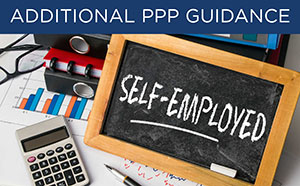Self-employed? You may qualify for a larger PPP loan
 Recent changes to Paycheck Protection Program (PPP) guidelines designed to help small businesses may allow many self-employed individuals the opportunity for a higher loan amount.
Recent changes to Paycheck Protection Program (PPP) guidelines designed to help small businesses may allow many self-employed individuals the opportunity for a higher loan amount.
New rules issued this week by the U.S. Small Business Administration (SBA) allow sole proprietors that file Form 1040, Schedule C, to calculate how much PPP funding they are eligible to receive using gross income rather than net profits.
Since many self-employed individuals generally do not record much net profits, using gross income will allow these borrowers potentially to receive more PPP funds than expected.
Unfortunately, this change is not retroactive, and those self-employed individuals that have already received approved PPP loans cannot increase their loan amount based on the new guidance.
NOTE: Owner compensation remains capped at the $100,000 limit. For example, if your gross income is $150,000, you will apply for PPP funds using the cap of $100,000 for the owner’s compensation. This is calculated as 2.5 months of the owners compensation capped at $100,000 (i.e. limited to $20,833).
Another important note is that any Schedule C borrower that reported more than $150,000 in gross income and used the gross income method of obtaining PPP funds are not automatically deemed to meet the necessity loan certification. Borrowers in this category may receive additional scrutiny from the SBA regarding their needs and the certification that “the uncertainty of current economic conditions makes necessary the loan request to support the ongoing obligations.”
The following are details about how to calculate your loan, allowable uses for the money, information about new loan forms, and what your lender may need.
Calculating your PPP loan eligibility
For those who have yet to apply for PPP funding, there are specific criteria you must follow depending on whether you have employees.
- Schedule C filer with employees
- May elect to calculate owner compensation share of payroll costs based on either 2019 or 2020 Schedule C:
- Net Profit, or
- Gross Income, less expenses reported on
- Employee Benefit Programs (Line 14)
- Pension and Profit-Sharing (Line 19)
- Wages less Employment Credits (Line 26)
- May elect to calculate owner compensation share of payroll costs based on either 2019 or 2020 Schedule C:
- Schedule C filer with no employees
- May elect to calculate the loan amount based on either 2019 or 2020 Schedule C:
- Net Profit, or
- Gross Income
- May elect to calculate the loan amount based on either 2019 or 2020 Schedule C:
Eligible PPP expenses
The following expenses are considered appropriate for PPP loan forgiveness:
- Owners’ compensation (net profit method) or proprietor expenses (gross income method)
- Employee payroll costs
- Mortgage interest
- Business rent payments
- Business utility payments
- Per Section 7A(a) of the Small Business Act
- Operational expenses
- Property damages
- Supplier costs
- Worker protection (PPE)
New PPP loan forms and what lenders may require
Along with its new guidance, the SBA also released new PPP loan application forms, including an updated First and Second Draw borrower application form for Schedule C filers.
Additionally, applicants may need to provide additional supporting documentation to their lender. Each lender may have a unique set of requested documents; however, most will require the following:
- 2019 or 2020 Schedule C Form
- 1099-MISC
- Invoice support for other allowable expenses
- Bank Statements showing expense activity
Bottom line
Although this new guidance is an excellent opportunity for the self-employed who need financial help, the rules are complex. We recommend consulting with your accounting professional and discussing PPP, ERTC, and any other SBA-related guidance.
The Boyer & Ritter team can provide business relief services to your entity. To learn more about engaging us for business relief assistance, please contact us HERE.
Mark Banks, CPA, CFE, MAFF is a supervisor and member of Boyer & Ritter LLC’s Business Relief Services team as well as the firm’s Advisory Services practice. Reach Mark at 717-761-7210 or mbanks@cpabr.com
Benjamin R. Bostic, CPA, is a director at Boyer & Ritter and is a member of the firm’s Business Relief Services team. Ben has experience providing tax, accounting and advisory services for closely-held businesses, individuals, not-for-profit organizations. Reach Ben at 717-264-7456 or bbostic@cpabr.com



